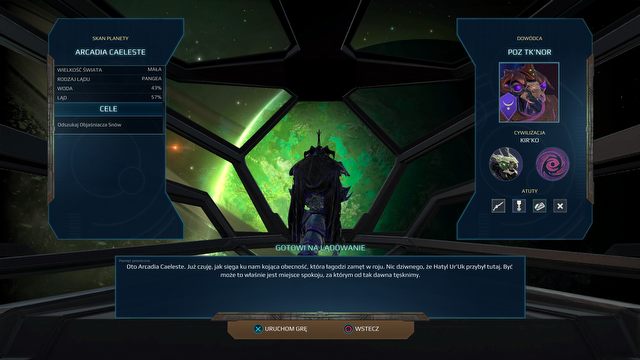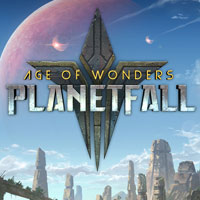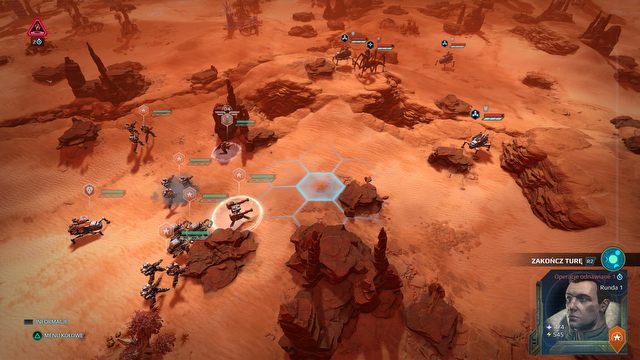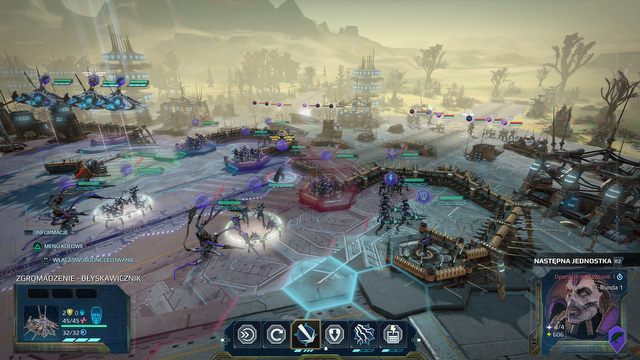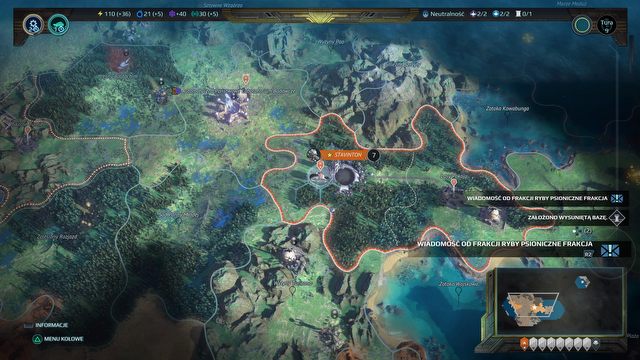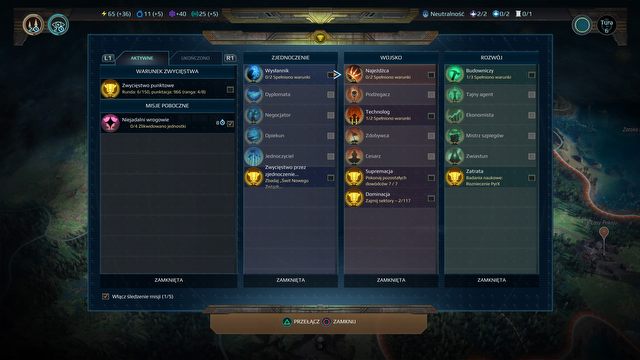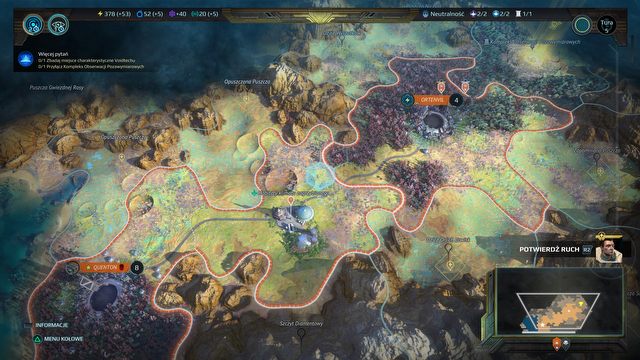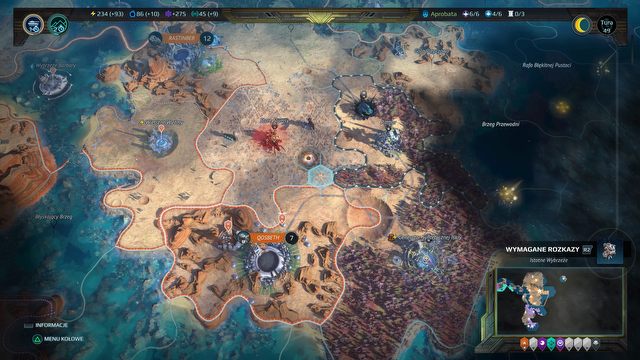Age of Wonders: Planetfall Review – Bartender! Civilization with XCOM please!
The creators of the cult series have moved into the distant future, used their best practices and created a game that we'll be playing for years to come. Age of Wonders: Planetfall is a successful strategy that more than makes up for its shortcomings.
The review is based on the PS4 version.
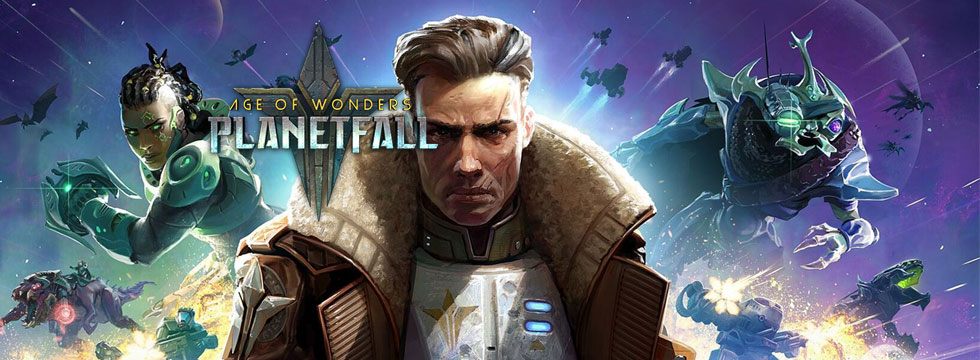
- interesting world and an exciting story campaign;
- cool, slightly satirical atmosphere;
- a fantastic mix of elements of Civilization and XCOM;
- various species and possibility of their modification;
- vast tactical capabilities;
- rich maps full of attractions;
- fantastic visuals, especially in the strategic mode;
- should suffice for months on end;
- perhaps the best console strategy.
- the amount of information and mechanics can be overwhelming;
- elements of sound design;
- one very annoying bug.
I must confess I used to have a difficult relationship with the Age of Wonders series. During the heyday of turn-based strategies, my hard drive was the exclusive domain of the legendary Heroes series, with the subsequent installments of the Disciples taking up the remaining megabytes. I never had the opportunity to test any of Triumph Studios' productions, though I understood they also should have been recognized as classics. So when I got the offer of writing a review of the latest installment of the cycle, I thought it was high time I got acquainted with the heroes of the Age of Wonders.
This means, of course, that although turn-based strategy is one of my favorite genres, I was a total newbie in case of this particular series. Which gave me a sort of carte blanche in approaching the new Age of Wonders, having no presuppositions derived from any previous experience. This perhaps made it easier for me to accept the peculiar atmosphere of this production, and evaluate its advantages more objectively. And there's plenty of these – Planetfall is one of the best realized games of its genre, one that's incredibly compelling, right from the first mission...
Twilight of the Star Union
Before the release, the biggest doubts among the fans were raised by the setting. At first glance, Age of Wonders brings to mind fantastic lands full of magic, inhabited by mythical creatures. In Planetfall, we get a hard sci-fi universe, to a degree inspired by retro-futurism. In addition, the developers approached the subject with a tongue-in-cheek attitude. The action takes place in a very distant future, in which humanity has created a galactic empire called the Star Union.
Although powerful, the union eventually disintegrates as a result of an incomprehensible cataclysm that turned most planets into post-apo worlds. Over time, from the ashes of this, once galactic, civilization, new forces began to emerge, oriented to realizing their own goals.
You should already see that the devs gave us quite a mixture of ideas, which could be especially baffling if you just expected the generic lot of elves and dwarves. Taking the risks ultimately paid off, though – everything if the game ended up as forcibly hyper-quantum and inter-dimensional; it’s exaggerated, vivid, and colorful like Coachella. “Gentlemen with cigars in their mouths and huge rifles shooting lasers at Space Amazons riding genetically modified dinosaurs” kind of exaggerated.
Overall, the game is designed with consistency and awareness, and at the same time looks really good. Although this type of setting isn't anything extremely original, this solid and, after all somewhat outlandish, setting really resonated with me. The curiosity of what other crazy technologies and units I could discover was one of the factors that fueled my desire to explore. Here, nothing stands in the way of realizing your most warped fantasies, such as downloading the minds of all citizens on a computer drive, or turning them into industrial robots, thereby increasing the productivity of factories.
The satirical approach is mostly visible in minor details. For example, discovering new technologies always prompts a window with an appropriate graphic and a quote, which is an obvious reference to Civilization. However, these quotations from fictional characters of the future are always kind of silly. Same as the descriptions of projects and units. During the game, I have many times encountered troops consisting of sexrobots from the previous era. They came in variants for both sexes and have the features of the "ideal man" and "ideal woman" – but presented in a skewed way.
Although the game is full of this kind of sense of humor, it doesn't mean the plot turns out shallow or infantile. The authors provide an alluring world, which, appealing to our nostalgia, is filled with funny references, but also doesn't shy away from more serious themes.
Where the hell did the space dwarves come from?!
The potential of this world has fortunately not been squandered in the story campaign. I must admit that in games of this type, the campaign mode has never been the main thing for me, and I always preferred casual gameplay. This time, out of a sense of duty, I launched the first few story missions, and, to my own surprise, I soon found myself engrossed in the story, anxious to see what happens next, what the whole cataclysm thing is about, and what's the history of individual species. And that's in a large part because of the way the creators conceptualized the game's universe.
One day, one of my probes flew into a large section of the map, completely covered by the ruins of a city with a large gravitational anomaly in the center. This spectacular sight made me really want to find out what happened to this place and whether I can use it myself. I think that if the action of the game took place in a classic fantasy world, I wouldn't find it so compelling.
The good impression isn't spoiled by the fact that some of the dialogues are the very definition of corny. That, however, further reinforces the cartoonish style of the whole game, and corresponds well with the assumed conventions.
Another strong element of the story campaign are the species, which we can study and observe. There were some very interesting ideas, such as the soldiers of the Avant-garde, who, after 200 years of hibernation, return to the Union sectors, which are completely destroyed after the mentioned cataclysm. Again, not a terribly original idea, but enough to maintain curiosity. How did a race of cyborgs even appear in this post-apocalyptic world? Are they former citizens, whose consciousness was merged with AI? Will the race of enslaved insects find their way home, and where the hell did these space dwarves come from? Finding answers to these questions can become your main hobby in life.
Build the alien of your dreams!
The parties to the conflict available in the game differ not only in appearance and history. Although each of them has a similar roster of units, they all clearly differ in details. The Vanguard, with which I started the adventure, is, for example, based on a sustainable economy and units fighting at a distance. When, after a while, I tried the cyborg race, I was quickly forced to give up, because – as it turned out – they're mostly fighting in close combat, and their strength is the ability to cannibalize parts from defeated enemies.
To some extent, the available races fit into the existing genre formulas. The Vanguard is basically "standard humans," the cyborgs (aka the Assembly) are the "undead army," and the Amazons are sort of "forest elves." However, this system was implemented with thought, and individual parties actually require a different style of play.
Whereas on the planes of plot and setting Planetfall is not afraid to play with the conventions, when it comes to gameplay, the game is a synthesis of proven solutions. The parties of the conflict can be modified using an editor similar to that of Stellaris, which gives great customization possibilities. The game has two main pillars: strategic and tactical, with the former being just a variation on the premises of Civilization. We develop colonies, discover new lands and build new cities.
The mainstay here is certainly the world map – with a myriad of details. In each sector we will find not only deposits of raw materials, but also buildings that perform a variety of functions. Some yield small bonuses to the visiting armies, while others offer ongoing support for our economy – if we can manage to capture them. This gives the game a pinch of role-playing seasoning, and often determines the expansion. The feeling of roaming planets and systems of a devastated galactic empire, full of powerful and mysterious installations and ruins, was quite remarkable.
OF RACES AND TECH
There's a total of six races in the game, each of which has its own units and unique mechanics. We can also choose one of the so-called secret technologies – a separate branch of the technological tree of a certain specialization. These are also six of these, including the path of psionic powers, AI synthesis, or development of weapons of mass destruction. They give access not only to specific perks, but also to new units, which directly affects the course of the game. In addition, we can modify our main character, deciding their role on the battlefield.
Although the commanders editor is not as extensive as the one in Stellaris, it also provides great opportunities to personalize and experiment with different builds.
Many ways to win
In the strategy mode, diplomacy and intelligence both play major roles. The latter even have their own technological tree and can affect the course of the game. My personal sentiment was that many 4X games underestimated the importance of intelligence in governing the country, while in Planetfall, clandestine strategic operations come with adequate gravity.
On one occasion, I faced severe power outage, balancing on the verge of energy deficit through a couple of turns. After some time, I received a report from which it followed that a neighboring empire organized a network specializing in energy theft on my territory. Instead of building more power plants, I invested in counterintelligence and thereby saved my economy, at the same time cutting the enemy off from the additional source of income.
Unfortunately, I was a little disappointed with the economy management itself, as it seemed oversimplified. Everything is based on systematic expansion, which – through acquiring subsequent sectors – regularly yields the vital resources. Aside from a few singular situations, I had no problem balancing resources and maintaining sustainability. I also felt the game could use a mechanic of workers akin to the one from Sid Meier's series. Here, we simply join a sector and choose its specialization – it would be nice, however, to see the mighty labor force of our country altering the landscape with each turn.
Planetfall: Enemy Unknown
The new Age of Wonders also draws inspiration from another well-known Firaxis brand, and does that quite openly. The entire tactical segment is modeled on the new installments in the XCOM series. When it comes to combat, we switch to the map of the battlefield and maneuver our army in turn-based battles. The potential of such a solution is enormous and the course and outcome of skirmishes is influenced by many factors – from the distribution of units on the map, through equipment and skills of our units, to special events specific to different types of terrain. Although the combat system can initially be overwhelming with the slew of options it offers, the game quickly turns that into an advantage.
As we progress further, we begin to notice how different elements of this complex puzzle can determine our success on the battlefield. Commanding the Vanguard units in the early stages of the game, I tended to immediately flood the enemy with constant fire, but the approach rarely resulted in a tangible advantage, and my army often suffered considerable casualties, even in minor battles. Over time, I began to allow the adversary to get closer, holding fire until the enemy would open up a bit, which significantly improved my results. There are a lot of such intuitive mechanics here, and discovering them is very satisfying.
The need to constantly improve your skills is, in my opinion, the biggest advantage of the combat system in Planetfall. The game forces constantly studying and reconsidering the available solutions. At the same time, this process is enjoyable and rewarding, as the results become apparent pretty quickly. Because of this, the battles are extremely engaging – even similar skirmishes often require testing new strategies, modifications or equipment of our troops. Eventually, we reach a point where even a single, light-armed colonist can, after a 15-minute thriller, come out on top from a clash with a horde of overgrown bugs.
THE BEST STRATEGY ON CONSOLES?
I played Age of Wonders: Planetfall on the PS4. While broadly understood strategy games are still the mostly a PC domain, this title shows that at least turn-based strategies can be totally playable on consoles as well.
The biggest problem is, of course, the issue of controls, but the developers have coped very well. Both the strategic and tactical map have been divided into hexes, making the pad accurate enough to effectively manage units. For all the time I spent in the game, I've never had problems with selecting units or sending them to the right places. Navigating the interface turns out a little more challenging, and the mouse can really improve the comfort here, but these problems mostly stem from too few available windows – not from the type of the controller.
The tutorial mode that's launched from the pad’s touch panel is also commendable. It allows to intuitively display contextual tips and hints, which is extremely useful during the game. An additional upside is also the fact that the strategic map looks just fabulous on a big screen.
Considering the level of quality presented by the game from Triumph Studio, at this point, it's probably the best strategy game available on current-gen consoles.
A sea of possibilities
Both the extent of possibilities and the depth offered by battles in Planetfall are highly impressive. The army consists of up to six units (including the main character), and each of them can be armed with three additional weapons (and there's a lot to choose from). Units of individual factions have their own modes of operation, and up to seven such armies can participate in one battle! Add to that the already mentioned weather/climate conditions, the division into infantry, armor, and air forces, as well as naval battles and special perks in the form of tactical operations. Mastering all this will require lots and lots of time.
On the other hand, this makes Age Of Wonders: Planetfall a game aimed at a very specific audience. Players who love learning games and thoroughly exploring complex mechanics will surely feel at home. However, even they will have to face the biggest drawback of this title. An ostensibly inherent feature of this type of games is not only high complexity, but also a high threshold of entry. It's also true for Planetfall, mainly because of the way the interface was conceived.
It's not poorly designed or anything, but the sheer amount of information that floods the screen every second makes you feel like you need a machete to cut through all that. Reading the next wall of text explaining some intricate mechanism of the game becomes tedious, especially since you also need to wrap your head around all the stats, and be able to interpret them in the context of the remaining information, which grows with every turn. I don't expect easy entertainment from strategy games, but I want the interface to allow quick access to whatever I'm interested in at the moment.
In Planetfall, it's easy to get lost in all these windows and land in a completely unexpected place. I'm still not sure where to find some of the more vital screens and charts, even though I'm sure I've seen them somewhere. But that could be attributed to the console port, which, although skillfully realized, is still inferior to PC in terms of controls.
Not only wonders
Speaking of shortcomings, I will now enumerate a few minor issues. For starters, I'd like to mention that the maps, on which we wage battles, are relatively small, which makes them feel a bit cluttered. Further, the saturation of different colors makes the battlefield somewhat illegible – the screen is sometimes a colorful mess.
I also have some reservations about the audio layer. While the music fits the atmosphere, some elements of the sound design could be improved. This is especially true of the combat sounds, because I found it hard to accept that the concentrated fire of my soldiers sounds like a burst from cap guns. I was also annoyed by some of the generic remarks of the characters. When upon opening the diplomacy window I heard "you have a message!" one time too many, I just turned the voice assistant off.
While the above sentiments may come across as fussy, I also experienced a very unpleasant glitch. It concerned a special view of the strategic map, where we can watch its economic summary. This is a very handy mode, which I often used when making deciding about creating a new colony or joining another sector.
Unfortunately, while playing in the open scenario, somewhere around the 80th turn, switching to it started crashing the console. Any time I wanted to enter that mode, I would invariably end up watching PS4's main menu after a few seconds, and in a couple of instances, I had to reboot the whole system. It became almost impossible to continue the game, which was, of course, disappointing. It happened, however, only in this one game and I hope the developers will look into this in subsequent patches.
Acute "one more turn" syndrome
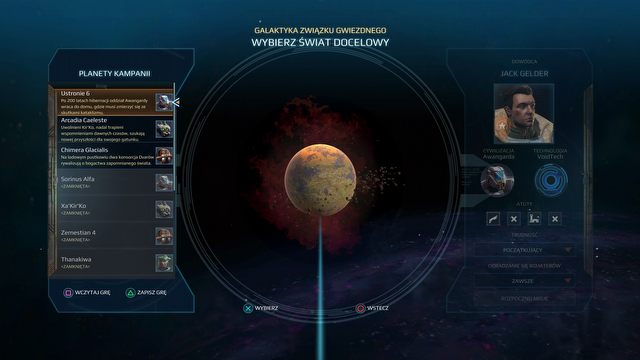
The campaign allows playing missions of different races, which is interesting from the perspective of the plot.
Age of Wonders: Planetfall is not perfect, but it definitely is among the best in the genre. After launching it for the first time, it devoured my entire weekend, and I didn't get off the couch if it wasn't absolutely imperative.
All the mechanics are well designed and thought through. The world, which caused so much concern before the premiere, turned out one of the best aspects of the game. The somewhat satirical and comic convention perfectly fits modern trends. And the combination of the best features of Civilization and XCOM rendered the game so engaging it should come with a warning on the box. The "one more turn" syndrome is here from the onset of gameplay, and it's so intense I'm thinking about playing even when writing this piece.
Age of Wonders: Planetfall is the best case in point proving we're in a golden age of strategic games. Here's another title that will please all the fans of this venerable genre, and the minor shortcomings do not spoil the overall impression. I'm certain the game will become a permanent member of my collection, and that I'll return to it many times in the future. I must warn you, however, that the galactic Age of Wonders will mercilessly eat up all your spare time.
ABOUT THE AUTHOR
As I noted in the introduction, Age of Wonders: Planetfall was my first exposure to the series, and I couldn't hope for a better first impression. I spent about 30 hours with the game, which was by no means enough to get to know it deeply. However, during this time I managed to play part of the story campaign and two big scenarios. I've also tested some of the available races, but I didn't come close to learning all the possible variants and combinations.
DISCLAIMER
We received the review copy of the game from the Polish distributor, CDP.
Age of Wonders: Planetfall
Age of Wonders: Planetfall Review – Bartender! Civilization with XCOM please!
The creators of the cult series have moved into the distant future, used their best practices and created a game that we'll be playing for years to come. Age of Wonders: Planetfall is a successful strategy that more than makes up for its shortcomings.


